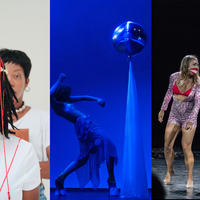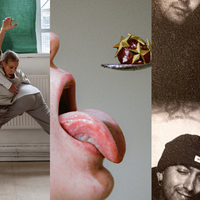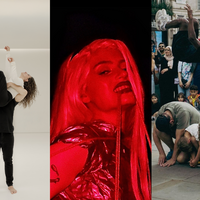Fri 7 Feb: Amy Mauvan, Jiwon Oh and Vivian Guyra

News Story
Amy Mauvan Blank Dress
Jiwon Oh Jeonghee
Vivian Guyrá TEKOHA
Jeonghee feels like a sacred insight, a warm embrace. With remarkable sensitivity, JiwonOh crafts a piece that she performs together with her grandmother, Jeonghee Jang, that has no clear beginning or end. As an audience we feel immersed in their personal world, witnessing an intimate moment between the two generations. Both Jiwon and Jeonghee seem to fully embrace the qualities inherent to their specific ages, which helps to create a truly magical atmosphere. How often do we get to witness human beings embodying their authentic self with such grace and confidence? With a complete absence of pretence, the two performers mesmerise throughout, creating potent images that provoke reflection on themes such as ancestral bonds, embodied memory, character and connection. Above all, Jiwon’s incredibly delicate yet powerful choreography gently cracks open a gateway to what we truly need – access to our feelings.
In their piece Tekoha, Vivian Guyrá delivers a powerful, embodied statement. They use earthy tones in lighting and costumes, along with sounds of rain and birds, to create a vivid connection to nature. The predominantly strong and grounded movement language of the seven dancers, particularly the recurring unison moments, reveals the power that a collective of moving bodies can hold. While there are instants of playful interactions between individuals, the performance as a whole emphasizes the strength of unity, thriving on the synchronicity of the group rather than the subtlety of individual gestures. This political message of solidarity and the potency of the collective is further supported by a banner at the end of the show, reading “Education is dignity”.
Amy Mauvan’s choreography Blank Dress starts off promising, as she curls up in the corner of the stage next to pianist Will South, hidden beneath an unidentifiable white cloth that is later revealed to be a classic wedding dress. The initial curiosity surrounding the theme of a woman in a white dress – evoking questions about its potential, expectations and anxieties – grabs attention at the outset. However, a deeper exploration of the performer’s personal relationship to this theme, beyond the burdening weight of the dress itself, seems to be lacking. The abrupt shifts in sound at times felt disjointed, missing the opportunity for a more nuanced inquiry on the rich possibilities in the interplay between performer and musician.
Livia Nissen
Time slows down in Jiwon Oh’s intimate dialogue with her grandmother, Jeonghee Jang, showing the "transmission of memory…revealing what is passed on, forgotten, and transformed". The focus is very much internal, shared between the two of them, as if Jiwon Oh had asked her grandmother to show her the games she used to play so that she could emulate them in her own body. Calling the work Jeonghee in homage to her grandmother, Jiwon Oh has created a timeless work whose movement and spirit are based on a game with a long piece of rope — as we arrive the two are splicing the rope as if they have been at work for much of the evening. The rule is to dance in the spaces made by the pattern of the rope on the ground, never on the rope itself. Jeonghee Jang plays this game with perfect rhythmic recall while Jiwon Oh extrapolates the movements in youthful exuberance. In watching her we see the youthful grandmother before our eyes. Utterly captivating.
Tekoha, by Vivian Guyrá, is like a danced manifesto, moulded by the social and political message that gives it birth. Guyrá "is a Latin American Indigenous choreographer who utilises movement to raise awareness about ethnic and environmental issues". Tekoha focuses on the identity and cultural heritage of the quilombolas —descendants of African slaves brought to Brazil — through a dance in which accents are heavily grounded, relating land to culture, the physical to the spiritual. It has elements of ritual dance and contemporary technique but the former always governs the latter. Synchronous group movement alternates with intensely sinewy articulated solos. Tekoha is mysterious and deeply emotional.
In Blank Dress, Amy Mauvan is at first so cocooned within her swathes of tulle that the image of an ostrich without its neck comes to mind. The image has nothing to do with Mauvan’s own idea of inhabiting a wedding dress that interrogates its wearer, but Blank Dress has that quality of never quite stating its intention. Even the words of the opening recorded text are hard to grasp, leaving the development of the work wandering aimlessly. With the dramatic unfolding of Mauvan’s almost bare torso from the tulle, the dress finally finds its place but the wearer has no answers to its questioning.
Nicholas Minns


